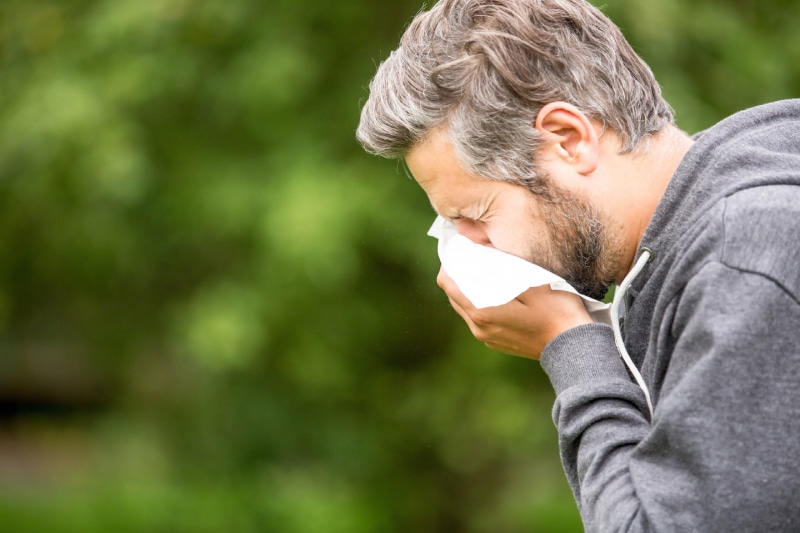
Many different insects and pests can trigger allergies—even for those who may not be sensitive to other allergens. Read on to learn what types of pests are most likely to cause allergies and how to address the problem.
Common allergy symptoms
Some of the most common allergy symptoms include:
- Skin rashes, itching, or hives
- Sneezing and nasal congestion
- Itchy, watery eyes
- Dizziness and/or lightheadedness
- Swelling of the lips, tongue, or throat
- Shortness of breath, trouble breathing, or wheezing
If you’re allergic to insects, your immune system may respond to coming in direct contact with them, including bites and stings, or you may have a reaction to their smell, excrement, casings, or dander.
Everyone experiences allergies differently. If you think you have an allergy, talk to your medical provider. They can recommend testing to determine what may be responsible for your symptoms.
Rodents and Insects That Cause Allergic Reactions
Pests are a year-round cause of allergies.The following are some of the most common types of pest-related allergies.
Dust mite allergies
Dust mites are a common allergen found in many homes. While they are small in size, they can have a significant impact on your health and comfort. Millions of Americans experience watery eyes, runny noses, and constant coughing due to dust mite allergies.
Dust mites thrive in your home because their food source is mostly dead skin, and they are most comfortable in temperatures ranging from 65 to 80 degrees Fahrenheit. Because the mites are so small, detecting them on your own can be difficult.
Cockroach allergies
Cockroaches are highly adaptable and can easily make their homes in a variety of environments, but they tend to prefer spaces that are warm, damp, dark, and offer a consistent food source.
The presence of cockroaches can contribute to allergy attacks due to their droppings and casings. People with asthma can sometimes experience moderate to severe breathing problems when exposed to cockroaches and their waste.
Aphid allergies
Aphids are tiny insects that burrow into plants to feed on leaves and stems. They usually live in large colonies and can destroy entire gardens when left untreated. Some species of aphids will even bite if threatened.
An aphid’s bite transmits venom to the skin. Although the substance isn’t poisonous, it can cause pain and swelling. Some people develop severe aphid allergy symptoms like shortness of breath or severe swelling following a bite.
Bed bug allergies
Bed bugs are parasitic insects that can infest mattresses, upholstered furniture, baseboards, door hinges, electronics, electrical fixtures, and other items in the home. These pests live off of the blood of mammals, particularly humans.
Although they don’t carry diseases, bed bugs can leave behind itchy red bites. For most people, the bites aren’t serious. However, if bitten, a person with a bed bug allergy could have a reaction.
Gnat allergies
Gnats are tiny flying insects related to mosquitoes and flies. Many are vegetarians, but some species will suck the blood of humans and other warm-blooded mammals.
Because these pests are so small, you’re unlikely to feel a bite. Some people will develop mild itching, pain, and swelling after a bite. A gnat allergy could result in shortness of breath and other dangerous symptoms that require emergency medical attention.
Termite allergies
Termites are wood-destroying insects that eat cellulose and can cause large home infestations. Although you’re unlikely to have a termite allergy, they can worsen asthma symptoms and create other allergens when burrowing through substances like wood. Cleaning thoroughly after a termite pest control treatment can help remove impurities from the air and ease allergy symptoms.
Rodent allergies
Rodents like mice and rats leave behind droppings, urine, and saliva, which can impact your allergies when you come into contact with them or even breathe air in spaces they’ve infested.
Common symptoms caused by rat allergies include:
- Itchy skin
- Eczema
- Nausea
- Stuffy or runny nose
Bee and wasp allergies
Stinging insects like wasps, hornets, and bees usually cause mild symptoms like pain, redness, swelling, and flushing. However, people allergic to insect stings may break out in hives, experience severe swelling of the face and throat, or even go into anaphylactic shock.
Boxelder bug and stink bug allergies
Boxelder bugs and stink bugs are members of the same family. Both of these insects will release an unpleasant odor if they feel threatened. For most people, the smell is merely annoying. However, some individuals will experience an allergic reaction if they breathe in the excreted chemicals. Reactions can range from mild and fleeting to severe enough to require medical treatment.
Pest control services
Household pests can impact your allergies by reducing air quality or directly triggering a reaction. Take care of yourself and your home with the help of professional pest control. Our licensed technicians can address infestations with the right tools and products for the job. In addition, we can share prevention tips to help reduce the risk of allergy-inducing pests returning in the future. Contact Hawx Pest Control today for a free estimate.
Categories
RELATED POSTS



